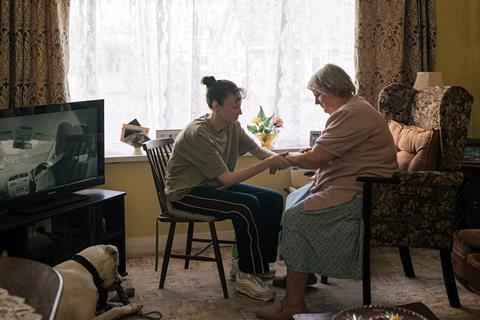
Paul Andrew Williams’ Dragonfly won the Golden Hitchcock for best film at the Dinard Festival Of British & Irish Film, which drew to a close in its French seaside setting on October 5.
Dragonfly stars Brenda Blethyn and Andrea Riseborough, and is the story of two women who strike up an unlikely friendship, when one takes it upon herself to care for her elderly neighbour. The drama has previously played at Tribeca, Karlovy Vary and Edinburgh, and Conic will release in UK-Ireland later this year.
The jury this year comprised of UK actors, filmmakers and writers Rupert Everett, Jennifer Saunders, Ruby Wax and Molly Dineen, as well as French actors Rachida Brakni and Reda Kateb, and French journalist Claire Chazal. Everett had to return home from the festival prematurely owing to a personal matter, with Chazal taking his place as chair of the jury.
Best performance went to Harry Lawtey for his turn in Marc Evans’ Mr Burton, the true story of the teacher who inspired and encouraged the metamorphosis of Welsh schoolboy Richard Jenkins into Hollywood acting legend Richard Burton. The film also took home the audience award.
The special jury prize was awarded to Thordur Palsson’s 1870s Iceland-set debut The Damned, while Daisy-May Hudson received the talent of tomorrow prize for her narrative feature debut, Edinburgh 2024 premiere Lollipop, about a woman striving to reclaim her life after a brief stint in prison.
The festival’s artistic director Dominique Green’s key takeaways from the line-up were a resurgence in popularity of social realist films and an increase in non-English language UK and Irish films, citing the use of Welsh in Mr Burton, Nigerian languages Yoruba and Naija in Akinola Davis Jr’s My Father’s Shadow, Gaelic in Damian McCann’s Aontas and Cornish in Edward Rowe’s short Poll Pri.
Green noted ticket sales among the older-skewing audience were more evenly spread than in previous years across all films from the outset, although Irish documentaries Sinead O’Shea’s Blue Road: The Edna O’Brien Story and Aoife Kelleher’s Testimony proved particularly popular.
Industry
A key focus in recent years for Green has been bolstering the industry presence, with a professionals’ rendezvous taking place on October 3, with this year’s subject of discussion being: what determines a film’s nationality? UK attendees included BFI Filmmaking Fund head Mia Bays and BFI Network Alice Cabañas, and from France, distributors Martin Jérôme of Condor, Mathieu Robinet of Tadmen Films, Céline Tissot from the Originals Factory and L’atelier de l’Image’s Hugues Peysson took part.
Maverick’s Raphael Hazan and Le Pacte’s Clara Bahri were also in attendance.
“There are still so many cross-channel subjects to discuss and we are attracting more distributors to attend, but funding is an issue,” Green told Screen. “The festival film guests are already here but other professionals have to be specially ‘imported’ from France, UK and Ireland, which is becoming increasing costly.”
Funding comes from Region de Bretagne, Irish Film Institute, Screen Ireland, Culture Ireland, British Council London and Paris, Visit Britain and the UK-government backed Great Britain & Northern Ireland Campaign.
In terms of private partnerships, the festival has noted a greater uptake in 2025 compared to 2024, when the Paris Olympic Games took a lot of attention away from potential sponsors.
A further challenge, Green says, is the festival may have outgrown the capacity on offer in Dinard, a modestly-sized seaside town in Brittany, where the festival has resided since 1989. “Our cinemas and screening rooms are relatively small and with the very big ticket demand across the board and sold-out shows, we had some disgruntled locals,” noted Green.

























No comments yet